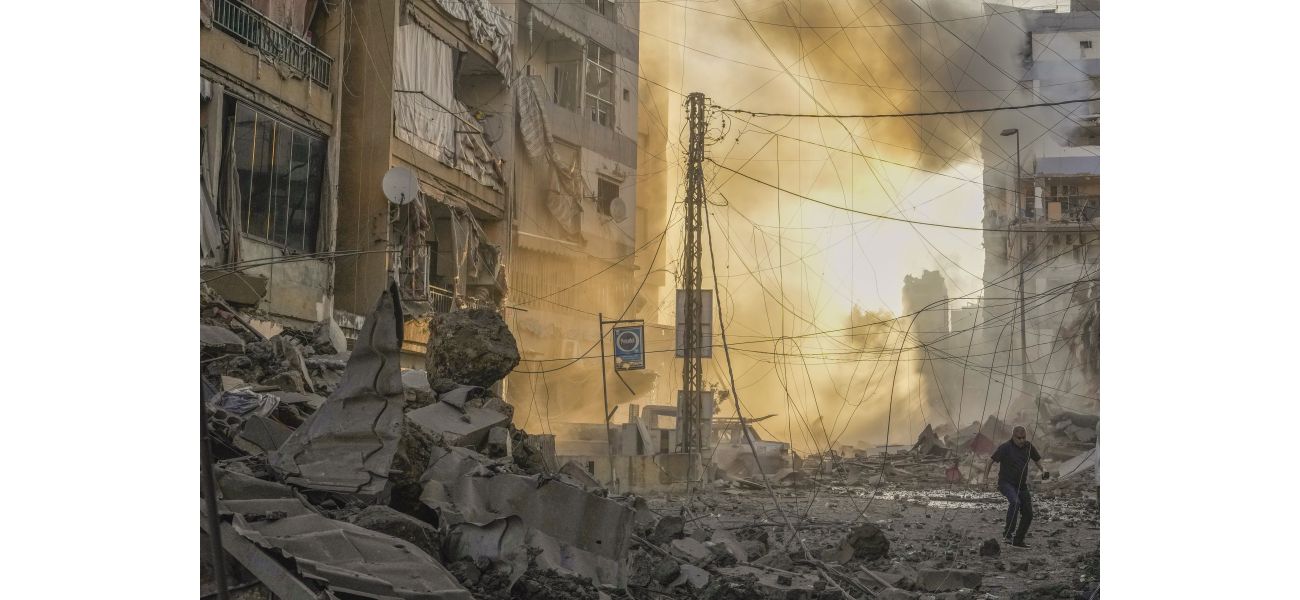Israeli airstrikes shake Beirut, isolating a crucial border crossing to Syria.
Israel launched heavy attacks, striking Beirut suburbs and blocking the main border for thousands escaping the bombing.
October 4th 2024.

Last night, Israel launched a series of powerful airstrikes, targeting suburbs of Beirut and causing widespread damage. The main border crossing between Lebanon and Syria was also hit, leaving tens of thousands of people stranded as they attempted to flee the intense bombardment by Israeli forces.
The explosions in Beirut's southern suburbs were so powerful that they sent massive plumes of smoke and flames into the night sky, and shook buildings in the Lebanese capital. The Israeli military has not commented on the intended target of the airstrikes, and there is currently no information available on any casualties. However, Lebanon's state-run National News Agency reported that there were more than 10 consecutive airstrikes in the area.
In the midst of this chaos, Australian billionaire has pledged $18 million in humanitarian aid to Gaza, where fighting between Israel and the militant group Hezbollah continues to escalate. Meanwhile, the Israeli military has reported that Hezbollah launched around 100 rockets into Israel on Friday, as the conflict raged on.
The military also confirmed that a strike in Beirut the day before had killed the head of Hezbollah's communications division, Mohammed Rashid Skafi. The Israeli forces described Skafi as a senior Hezbollah terrorist who had been in charge of the group's communications unit for over 20 years and had close ties with high-ranking officials.
The strike along the Lebanon-Syria border, about 50 kilometers east of Beirut, caused the closure of the busy Masnaa Border Crossing. Israel claims that the crossing was being used by Hezbollah to transport military equipment from Iran and other proxy groups into Lebanon. The Israeli fighter jets targeted a tunnel used for smuggling weapons, as Hezbollah is believed to receive much of its weaponry from Iran through Syria. The militant group has a strong presence on both sides of the border and has been actively supporting Syrian President Bashar Assad's forces in the ongoing conflict.
Video footage from the Associated Press showed two huge craters on either side of the road near the strike site. People were seen getting out of their cars, carrying their belongings as they had to cross the area on foot, unable to pass through due to the destruction caused by the airstrikes.
The situation has become increasingly dire for the thousands of people fleeing the war in Lebanon, who have been forced to cross into Syria over the past two weeks. The new wave of airstrikes comes after Israel warned residents in southern Lebanon to evacuate, including areas that were previously designated as a buffer zone by the United Nations following the 2006 war between Israel and Hezbollah.
On Tuesday, Israeli ground forces entered Lebanon and have since been engaged in clashes with Hezbollah militants in a narrow strip along the border. Prior to the ground incursion, a series of attacks by Israeli forces had already killed several key members of Hezbollah, including its longtime leader, Hassan Nasrallah.
In the midst of this escalating conflict, Iran's Foreign Minister Abbas Araghchi arrived in Beirut on Friday for meetings with Lebanese officials. During his visit, he warned that if Israel were to attack Iran, Tehran would retaliate with a strong response. Iran is Hezbollah's main supporter, providing weapons and billions of dollars to the group over the years.
In Tehran, the country's Supreme Leader Ayatollah Ali Khamenei delivered a speech at Friday prayers, praising Iran's recent missile strike on Israel and reaffirming their readiness to launch further attacks if necessary. He spoke to a large crowd at the Mosalla mosque, which was adorned with a massive Palestinian flag.
The strike at the main border crossing was the first time it had been closed since the start of the war. According to Lebanese General Security, over 250,000 Syrian citizens and 82,000 Lebanese citizens have crossed into Syrian territory since September 23, when Israel began its heavy bombardment of southern and eastern Lebanon. Most of the border crossings between the two countries remain open, and Lebanon's minister of public works has assured that they are all under the supervision of the state.
The exchange of fire between Israel and Hezbollah has been ongoing across Lebanon's southern border almost every day since Hamas carried out a cross-border attack in October 2023, resulting in the death of 1200 Israelis and the capture of 250 others.
In the occupied West Bank, the Israeli army said it carried out a strike on Thursday in Tulkarem, a stronghold for militants, in coordination with the Shin Bet internal security service. The Palestinian Health Ministry reported that 18 people were killed in the strike on a refugee camp.
Violence has been rampant in the occupied territory since the outbreak of the Israel-Hamas war in October 2023, particularly in Tulkarem and other northern cities. Israel declared war on Hamas in response to the attack, resulting in the deaths of over 41,000 Palestinians, with more than half of them being women and children, according to local health officials. In Lebanon, nearly 2000 people have been killed since September 23, according to the Lebanese Health Ministry.
On Friday, the Israeli military reported that militants in Gaza had fired two rockets into Israeli territory, marking the first time in about a month that rockets had been launched from Gaza. One of the rockets was intercepted by Israel's Iron Dome missile defense system, while the other landed in an open area near a kibbutz on the border with Gaza. The number of rocket attacks from Gaza into Israel has significantly decreased since the start of the war.
The explosions in Beirut's southern suburbs were so powerful that they sent massive plumes of smoke and flames into the night sky, and shook buildings in the Lebanese capital. The Israeli military has not commented on the intended target of the airstrikes, and there is currently no information available on any casualties. However, Lebanon's state-run National News Agency reported that there were more than 10 consecutive airstrikes in the area.
In the midst of this chaos, Australian billionaire has pledged $18 million in humanitarian aid to Gaza, where fighting between Israel and the militant group Hezbollah continues to escalate. Meanwhile, the Israeli military has reported that Hezbollah launched around 100 rockets into Israel on Friday, as the conflict raged on.
The military also confirmed that a strike in Beirut the day before had killed the head of Hezbollah's communications division, Mohammed Rashid Skafi. The Israeli forces described Skafi as a senior Hezbollah terrorist who had been in charge of the group's communications unit for over 20 years and had close ties with high-ranking officials.
The strike along the Lebanon-Syria border, about 50 kilometers east of Beirut, caused the closure of the busy Masnaa Border Crossing. Israel claims that the crossing was being used by Hezbollah to transport military equipment from Iran and other proxy groups into Lebanon. The Israeli fighter jets targeted a tunnel used for smuggling weapons, as Hezbollah is believed to receive much of its weaponry from Iran through Syria. The militant group has a strong presence on both sides of the border and has been actively supporting Syrian President Bashar Assad's forces in the ongoing conflict.
Video footage from the Associated Press showed two huge craters on either side of the road near the strike site. People were seen getting out of their cars, carrying their belongings as they had to cross the area on foot, unable to pass through due to the destruction caused by the airstrikes.
The situation has become increasingly dire for the thousands of people fleeing the war in Lebanon, who have been forced to cross into Syria over the past two weeks. The new wave of airstrikes comes after Israel warned residents in southern Lebanon to evacuate, including areas that were previously designated as a buffer zone by the United Nations following the 2006 war between Israel and Hezbollah.
On Tuesday, Israeli ground forces entered Lebanon and have since been engaged in clashes with Hezbollah militants in a narrow strip along the border. Prior to the ground incursion, a series of attacks by Israeli forces had already killed several key members of Hezbollah, including its longtime leader, Hassan Nasrallah.
In the midst of this escalating conflict, Iran's Foreign Minister Abbas Araghchi arrived in Beirut on Friday for meetings with Lebanese officials. During his visit, he warned that if Israel were to attack Iran, Tehran would retaliate with a strong response. Iran is Hezbollah's main supporter, providing weapons and billions of dollars to the group over the years.
In Tehran, the country's Supreme Leader Ayatollah Ali Khamenei delivered a speech at Friday prayers, praising Iran's recent missile strike on Israel and reaffirming their readiness to launch further attacks if necessary. He spoke to a large crowd at the Mosalla mosque, which was adorned with a massive Palestinian flag.
The strike at the main border crossing was the first time it had been closed since the start of the war. According to Lebanese General Security, over 250,000 Syrian citizens and 82,000 Lebanese citizens have crossed into Syrian territory since September 23, when Israel began its heavy bombardment of southern and eastern Lebanon. Most of the border crossings between the two countries remain open, and Lebanon's minister of public works has assured that they are all under the supervision of the state.
The exchange of fire between Israel and Hezbollah has been ongoing across Lebanon's southern border almost every day since Hamas carried out a cross-border attack in October 2023, resulting in the death of 1200 Israelis and the capture of 250 others.
In the occupied West Bank, the Israeli army said it carried out a strike on Thursday in Tulkarem, a stronghold for militants, in coordination with the Shin Bet internal security service. The Palestinian Health Ministry reported that 18 people were killed in the strike on a refugee camp.
Violence has been rampant in the occupied territory since the outbreak of the Israel-Hamas war in October 2023, particularly in Tulkarem and other northern cities. Israel declared war on Hamas in response to the attack, resulting in the deaths of over 41,000 Palestinians, with more than half of them being women and children, according to local health officials. In Lebanon, nearly 2000 people have been killed since September 23, according to the Lebanese Health Ministry.
On Friday, the Israeli military reported that militants in Gaza had fired two rockets into Israeli territory, marking the first time in about a month that rockets had been launched from Gaza. One of the rockets was intercepted by Israel's Iron Dome missile defense system, while the other landed in an open area near a kibbutz on the border with Gaza. The number of rocket attacks from Gaza into Israel has significantly decreased since the start of the war.
[This article has been trending online recently and has been generated with AI. Your feed is customized.]
[Generative AI is experimental.]
0
0
Submit Comment





